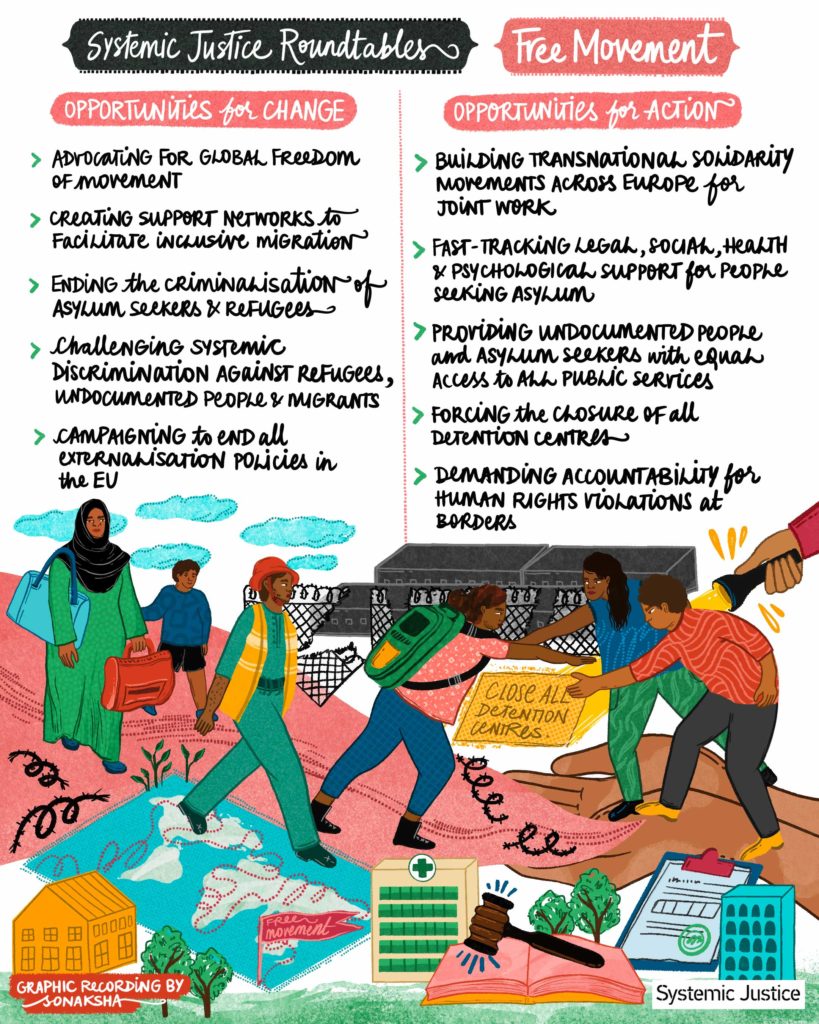“We’re trying to create a change in society’s perception of immigration. It’s not just a necessity. Detention centres should no longer be an option.”
Freedom of movement underpins the full and free realisation of a person and their rights. It can be vital for safety and security, family life, or someone’s identity. Yet, the right to freedom of movement is often undermined and those who seek to exercise the right are frequently subjected to human rights violations and marginalisation. The region has been dubbed “fortress Europe” due to the excessive methods it deploys in making its borders virtually impermeable, at increasing physical distance from its physical borders, and increasingly with the aid of invasive technological tools. These forms of oppression cut across racialised and marginalised groups, whether they are categorised as citizens, migrants, refugees, asylum-seekers, stateless persons, or persons without fixed habitation.

Restrictions on free movement are often rooted in histories of imperialism, colonialism, and inequality, and the conversations at our recent –– and last in our series of six –– roundtable on free movement showed not only the compounded harm this inflicts on people with intersecting identities, but also how state policies of exclusion from essential services shifts the burden of helping people face these challenges to peers, allies, and the non-profit sector.
Three themes in particular stood out.
First, the problem of criminalisation. States’ propensity to respond to challenges by taking criminal measures disproportionately affects migrant women and sex workers. For example, anti-trafficking frameworks, while ostensibly aimed at providing protection, are being used to criminalise asylum seekers who are victims of trafficking. This includes criminal prosecution for acts they’ve had to undertake as part of their journey. A similar dynamic is at play when it comes to migrant women workers in other fields. As one of the participants said: “a lot of the work they do is extremely gendered and highly racialised: domestic work, care work, nursing. And it’s work that doesn’t get visibility or empathy from the public. Their workspace isn’t visible or even considered a workspace, and since they’re undocumented everything they do is criminalised.”
The theme of criminalisation and carceral punishment is pervasive in migration. This is one of the areas where the second theme, the lack of access to justice, is poignant. The common practice of placing migrants and asylum seekers in detention centres where people are detained indefinitely, often without proper legal representation or other support such as translation or interpretation assistance, with the threat of deportation hanging over them for years is inhumane. The treatment of non-white refugees also stands in stark contrast to the treatment given to white Ukrainian refugees, who are being fast-tracked through the system, which is increases the already existing backlog for other, non-white refugees. If someone wants to challenge these racist practices in court, thy are faced with a discriminatory justice system: the mere fact that a complainant is still “in the system” means it is impossible to be a “perfect victim” in the eyes of the court, so the odd are stacked against you.
A third common thread was exclusion from public services. With systematic practices across European states to exclude specific groups from being able to access essential services –– a theme that ran through our social protection roundtable as well –– much of the vital work to support people facing a hostile system is being left to collectives, charities, and informal networks of solidarity between refugees, migrants, undocumented people, and allies. This includes anything from arranging an electric wheelchair for a disabled undocumented person, providing mental health support, writing bail applications, to making space for people to gather and heal, and informing people of their rights and freedoms. Few have received formal training for the work they take on, but there is no other option. “I only came here to seek asylum, not to be a support person. But it is what we find ourselves doing without training or any support. When you get a text in the middle of the night you have to respond because the person may have just arrived and knows no one else in the country.”
Participants envisaged big and bold solutions, such as a complete overhaul of the system currently keeping Europe’s border policing system in place and making it possible for people to apply for asylum anywhere in the world. They also identified ways in which the current, flawed, system could at least be improved, such as:
- setting clear timeframes for deciding on asylum applications,
- regularising immigration status by law,
- fast-tracking social, health and psychological support for people seeking asylum, and
- creating accountability for human rights violations across the immigration chains leading to Europe.
Across the exchanges of opportunities for change and action was a strong sense of the need to build transnational solidarity movements for people working on similar issues across Europe so people can strategise, share knowledge, build power, and develop joint campaigns.
“I hope that we continue to build networks of solidarity, sharing capacity and skills, so that we can ultimately create wholly different systems of migration.”
